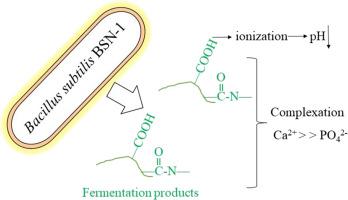Science of the Total Environment ( IF 8.2 ) Pub Date : 2020-09-24 , DOI: 10.1016/j.scitotenv.2020.142511 Ziyan Wang , Wenjuan Tan , Dengqin Yang , Keqing Zhang , Liwei Zhao , Zhengguo Xie , Tao Xu , Yuwei Zhao , Xiaonan Wang , Xiangliang Pan , Daoyong Zhang

|
Soil salinization and alkalization is one of the most devastating environmental problems, threatening the sustainable development of agriculture. Bio-amelioration using microorganisms such as bacteria is a promising method for the remediation of calcareous sodic and saline-sodic soil due to its high efficiency, low cost and environmental-friendly characteristics. In the present study, a salt resistant bacterium, Bacillus subtilis BSN-1, was isolated from arid region in Xinjiang, China, and its effects on salt crystallization during evaporation crystallization of saline-alkali soil solution were examined. It was found that the fermentation products of B. subtilis BSN-1, such as glutamic acid, significantly lowered the pH of saline soil solution because of the ionization of carboxyl. The complexation between Ca2+ and fermentation products inhibited the precipitation of Ca–P compounds as well, since the binding sites supplied for Ca2+ is one or two orders of magnitude than that for HPO42−. Moreover, the increased content of active phosphate is attributed to the chelation and adsorption exerted through carboxyl and amide bonds. These findings demonstrated that Bacillus subtilis BSN-1 suppressed the crystallization of phosphate and therefor increased the content of active phosphate, which may provide a promising solution for amendment and remediation of saline-alkali soil.





















































 京公网安备 11010802027423号
京公网安备 11010802027423号